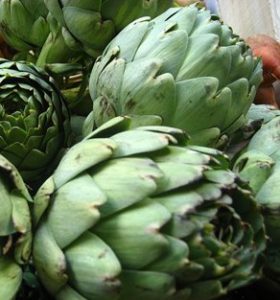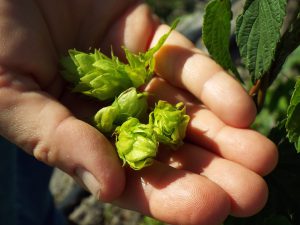B lackberries, hops, pomegranates and more were highlighted at our recent Florida Ag Expo with a focus on providing alternative crops for central Florida growers. With the citrus greening issues nearly devastating Florida’s top crop in recent years, growers are looking for new cash crops to keep agriculture strong in the Sunshine State. Gulf Coast Research is taking the lead in providing growers with the research they need to determine what the next big crop will be in our area.
lackberries, hops, pomegranates and more were highlighted at our recent Florida Ag Expo with a focus on providing alternative crops for central Florida growers. With the citrus greening issues nearly devastating Florida’s top crop in recent years, growers are looking for new cash crops to keep agriculture strong in the Sunshine State. Gulf Coast Research is taking the lead in providing growers with the research they need to determine what the next big crop will be in our area.
Dr. Shinsuke Agehara, GCREC Plant Physiologist, is heading up several research crops at Gulf Coast with positive results. Blackberries are popular, delicious and full of potential profitability. There are some blackberry varieties can be grown in Florida, mostly wild varieties. These plants do not offer the commercial selling traits as they are smaller in size, produce a low yield and mature later than northern commercial varieties that are more appealing to the market place. However, with UF’s assertive breeding program along with Dr. Agehara’s management practices, GCREC has had some success with this crop, and we are seeing great interest from growers.
Another interestin g crop in Dr. Agehara’s program is artichokes. Most artichokes in the U.S. are grown in California, but we have seen some success here at GCREC with this interesting crop. This fall/winter growing season will be the next test for this fledgling crop. The hot, damp summer weather in Florida tends to force open the plant buds and then the edible portions are damaged or become disease prone. So we have to shift our thought process to the fall/winter months as we do with many cash crops in our area.
g crop in Dr. Agehara’s program is artichokes. Most artichokes in the U.S. are grown in California, but we have seen some success here at GCREC with this interesting crop. This fall/winter growing season will be the next test for this fledgling crop. The hot, damp summer weather in Florida tends to force open the plant buds and then the edible portions are damaged or become disease prone. So we have to shift our thought process to the fall/winter months as we do with many cash crops in our area.
One alternative crop making a lot progress in our fields are hops. We have already had one successful harvest and a loc al brewery produced 60 gallons of one of Florida’s first commerical brews. As our next crop of hops starts growing, we are feeling very confident in this crop becoming a viable interest for craft breweries, home brewers and growers alike.
al brewery produced 60 gallons of one of Florida’s first commerical brews. As our next crop of hops starts growing, we are feeling very confident in this crop becoming a viable interest for craft breweries, home brewers and growers alike.
As GCREC continues to find new alternative crops that work well in our climate, our team of researchers will take the chance to build on existing research with the sincere hope and promise for new agricultural ventures for the Florida grower. With all scientific research there will be failures along with successes. We appreciate the failures as much as the successes because positive, workable research can only be based on the ups and downs of scientific methods used by our research teams.
 0
0
